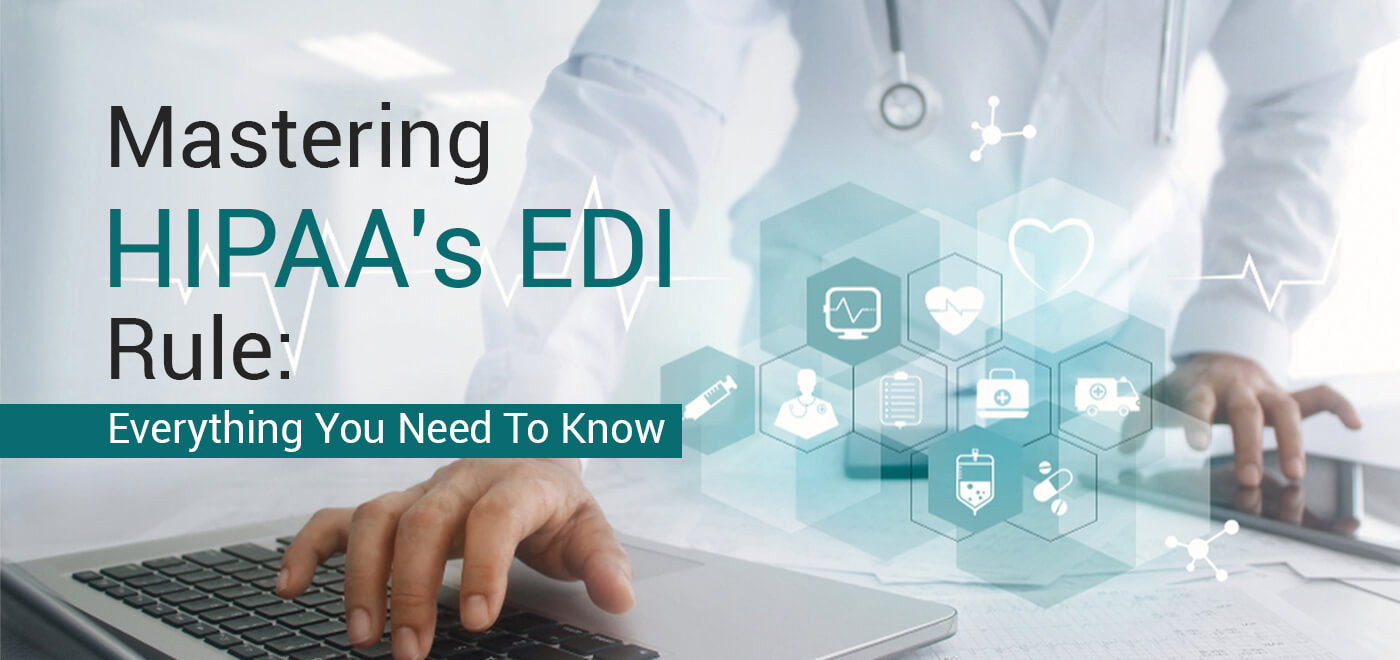HIPAA is a key law from 1996 that protects patients’ healthcare information privacy and security. Therefore, it also makes healthcare work simpler. HIPAA has rules for healthcare providers and others to keep health information safe and available. One part of HIPAA is the EDI rule.
Purpose and Value of the EDI Rule
The EDI Rule is a big part of HIPAA. It makes electronic healthcare information sharing easier and more standard. Its main goal is to make healthcare work better, lower costs, and keep patient data private and secure. In short, the EDI Rule says specific transaction rules and code sets must be used for sharing healthcare data electronically. Covered groups and their partners must follow these rules to stay compliant with HIPAA and avoid penalties.
EDI solutions help healthcare groups follow the EDI Rule. So, these tools let data be shared between different systems in a safe, accurate, and fast way. With the help of EDI, healthcare providers can make their work better, lower mistakes, and give better patient care. Hence, EDI also helps groups stay aware of new rule changes, making it easier to stay compliant with changing HIPAA rules.
Understanding HIPAA Transactions and Code Sets
What are Transactions and Their Types
HIPAA transactions are the standard ways healthcare data is shared between groups electronically. In short, these transactions help healthcare providers, insurers, and others communicate better and save money. There are many kinds of HIPAA transactions, like:
- Claims and encounter information
- Payment and remittance advice
- Benefits enrollment and maintenance
- Eligibility questions and answers
- Authorization and referrals
Using EDI services help groups handle these transactions safely and well, meeting HIPAA’s tough rules.
Standard Code Sets
Code sets are standard codes for medical details, steps, and other healthcare data in electronic transactions. Using standard code sets keeps data clear and steady between different groups. Therefore, HIPAA says specific code sets must be used, like:
- International Classification of Diseases (ICD): For reporting medical details and inpatient steps.
- Current Procedural Terminology (CPT): For reporting outpatient and office steps done by healthcare providers.
Hence, using EDI service helps groups make using these standard code sets easier in their transactions. These services make sure the right codes are used, which can lower mistakes, make billing simpler, and improve communication between healthcare groups. By using EDI HIPAA service, groups can follow HIPAA’s rules and make their work better overall.
Responsibilities of Entities and Business Partners
HIPAA Covers
HIPAA covers some groups that need to follow the rules to protect patient health information. These groups are:
- Healthcare providers: Doctors, dentists, hospitals, and clinics that share electronic health data in certain transactions.
- Health plans: Insurance companies, HMOs, Medicare, and Medicaid programs that give health coverage and benefits.
- Healthcare clearinghouses: Groups that change healthcare data from one form to another, like billing services and repricing companies.
EDI helps these groups follow HIPAA rules by giving special services and tools for safe and efficient electronic transactions.
Business Associates and Their Jobs
Business associates are groups or people who work for covered groups that need to use or share protected health information (PHI). Examples of business associates are:
- IT helpers and sellers: Groups giving software, hardware, or support services for handling PHI.
- Billing and coding services: Groups that handle claims and money transactions for healthcare providers.
- Legal and accounting firms: Experts who need access to PHI to help covered groups with their services.
Business associates also need to follow HIPAA rules, making sure they protect and keep PHI safe. On the other hand, they must sign a Business Associate Agreement (BAA) with the covered group, saying what their jobs and promises are for handling PHI.
EDI solution providers can help both covered groups and business associates with the hard parts of following HIPAA rules. By giving special services and tools for safe electronic health transactions. As a result, providers let groups focus on their main work while making sure data stays private and safe.
Key Components of HIPAA’s EDI Rule
Clear Transaction Rules
Transaction rules are key to the EDI Rule under HIPAA. These rules make a standard way to share healthcare information electronically. As a result, this helps different groups communicate with each other easily. The most common rule is the ASC X12 format. Hence, this rule makes it simple to share healthcare data like claims and payment advice.EDI service gives tools and helps to follow these rules. This makes sure groups follow HIPAA rules and work better.
Code Sets
Code sets are sets of codes for medical things like diagnoses and treatments. HIPAA says groups must use certain code sets like ICD, CPT, and HCPCS. So, this keeps data the same between healthcare groups.
EDI providers help groups use these code sets right. They give tools and help to make sure the right codes are used. This lowers mistakes and makes billing work better.
Unique IDs
Unique IDs are important for HIPAA’s EDI Rule. So they keep healthcare data correct and safe. HIPAA says groups must use different unique IDs for different things. Some examples are:
- National Provider Identifier (NPI): A special 10-digit number for healthcare providers and groups. This helps share healthcare information electronically.
- Health Plan Identifier (HPID): A special ID for health plans. This makes billing and other work easier.
- Standard Unique Employer Identifier (EIN): A special ID from the IRS for employers to use for taxes.
EDI service groups and Electronic Data Interchange software providers help with using these unique IDs right. They give tools and help to make sure the right IDs are used. As a result, groups follow HIPAA rules and work better overall.
Steps to Achieve EDI Compliance
Checking Your Group’s Readiness
The first step for EDI is to see if your group is ready. Look at your current systems, workflows, and how you handle data. So think about the following:
- The types of transactions you do, and what HIPAA rules apply.
- How you use code sets and any gaps in following HIPAA rules.
- Your group’s data privacy and security to keep health information safe.
EDI outsourcing can help during this check. Experts can show you what needs to improve and how to reach compliance.
Making Needed Changes
After finding what changes to make, start making them. This may include:
- Changing your systems to use the right transaction rules and code sets.
- Adding new data privacy and security measures like encryption and access controls.
- Creating rules for handling electronic healthcare data, like using unique IDs.
EDI can help you with these changes. Hence, they offer tools and know-how to make the process easier.
Training Workers and Staying Compliant
EDI compliance takes ongoing work. One important part is training your workers. This means:
- Regular training for workers who handle electronic healthcare data to make sure they understand HIPAA rules.
- Ensuring that workers are knowledgeable about the latest regulations and most effective practices.
- Building a culture of compliance by showing the importance of protecting health information and following HIPAA rules.
Also, staying compliant means checking your group’s work often. Fix any problems you find. Therefore, regular checks and help from EDI partners can keep your group compliant with changing healthcare rules.
Benefits of Implementing the EDI Rule
Using the EDI Rule under HIPAA has many good things for healthcare groups. So, it helps work go faster, keeps data safe and private, and lowers costs.
Firstly, the EDI Rule helps healthcare work go faster. By using the same electronic ways to share data, groups can share info easily and make fewer mistakes. EDI software helps more by doing things like checking data and sending it automatically.
Next, the EDI Rule makes data safer and more private. HIPAA EDI software has strong safety features like encryption and access control. These keep electronic healthcare data safe from people who shouldn’t see it. This helps patients trust their healthcare providers and makes sure groups follow the rules.
Lastly, the EDI Rule lowers costs. By using electronic ways to share healthcare data, groups don’t need to do as much work by hand or use paper. Hence, this saves time, resources, and money.
As a result, healthcare groups get many good things from using EDI software and the right ways to share data. This helps them follow the rules and makes healthcare work better.
Common EDI Compliance Challenges and Solutions
Fixing Technical Issues
A big problem with EDI is fixing technical issues. Healthcare groups often find it hard to use EDI systems with their current setup and adjust to new EDI rules. To fix these problems, groups can use EDI tools that work well with healthcare needs. They can also work with EDI service providers who know how to fix technical problems. This helps make the switch to EDI rules easier and faster.
Keeping Data Correct and Safe
Good data is important for healthcare workers and following rules. But, keeping electronic healthcare data correct can be hard because of many data sources and mistakes. To fix this problem, groups can use tools that check data for errors in their EDI systems. These tools find and fix mistakes before they cause bigger problems. Also, teaching workers about data safety and the right codes can help prevent mistakes and make it easier to follow EDI rules.
Protecting Privacy and Security
Privacy and security are very important for EDI. Healthcare groups must keep patient information safe. To do this, groups need strong security like access controls and encryption in their EDI systems. They should also check and update their security rules often. Teaching workers about privacy and security and having a way to report problems can help keep data safe. By using good technology, rules, and training, healthcare groups can protect privacy and security while following HIPAA EDI formats.
Tools and Resources for EDI Compliance
EDI Software
EDI software is vital for following HIPAA EDI rules. These special tools help safely and quickly share healthcare information between groups, making sure they follow needed transaction standards, code sets, and unique identifiers. Therefore, EDI software not only makes electronic healthcare transactions easier but also has strong security features to keep sensitive health information safe, helping groups meet privacy and security needs.
HIPAA Help Lists and Resources
To help groups with EDI HIPAA compliance, there are HIPAA help lists and resources. These resources often give guidance on important parts of HIPAA rules, like transaction standards, code set needs, and privacy and security steps. So, by using these help lists and resources, groups can better understand their jobs under HIPAA and find any gaps in their current processes that need fixing to follow EDI standards.
Outside Help and Experts
Lastly, outside help and experts can be very useful for groups trying to follow EDI rules under HIPAA. These experts have special skills and experience in healthcare information management and can give custom help and support to guide groups through the hard parts of EDI compliance. So, by working with trusted EDI service providers, groups can use their knowledge, get the newest tools and technology, and have ongoing support to keep following EDI standards in the always-changing healthcare world.
Staying Up-to-Date with EDI Rule Changes
Watch for Rule Updates
Stay aware of changes in EDI rules by checking updates often. Watch for news from groups like the Department of Health and Human Services (HHS) and the Centers for Medicare & Medicaid Services (CMS). Hence, this helps you know what new rules to follow. By paying attention, healthcare groups can handle new issues and keep up with changing EDI rules.
Join Industry Events
A great way to learn about EDI Rule changes is to go to industry events. Therefore, you can meet other healthcare workers, hear about new ideas, and learn the best ways to follow EDI rules. Therefore, by taking part in events, groups can grow their skills and stay ahead in healthcare information and rules.
Work with Healthcare Compliance Groups
Finally, team up with healthcare compliance groups to keep up with EDI Rule changes. These groups watch and explain rule changes and offer helpful tips to their members. By joining and working with these groups, healthcare providers can learn about new rules, trends, and the best ways to follow EDI rules. Being part of these groups helps organizations stay aware of new EDI rules and how to follow them. By fostering a culture of compliance and preparedness, healthcare organizations can minimize the impact of potential penalties and violations related to HIPAA EDI transactions.
Conclusion
In conclusion, achieving and maintaining EDI compliance is crucial for healthcare organizations to ensure efficient operations, data security, and regulatory adherence. By implementing the necessary standards, investing in the right tools, and staying informed about the latest developments, organizations can successfully navigate the complexities of the EDI Rule. Hence, unlock the full potential of electronic data interchange in the healthcare industry.
As you move forward in your journey toward HIPAA EDI compliance, remember that it is an ongoing process requiring constant vigilance and adaptation. To help you stay on track, consider partnering with experienced professionals, engaging with industry organizations, and leveraging advanced software solutions tailored to your needs.
Ready to conquer HIPAA’s EDI Rule and streamline your healthcare operations? Don’t wait any longer! Dive into our comprehensive guide, “Mastering HIPAA’s EDI Rule: Everything You Need to Know,” and therefore, unlock the secrets to achieving and maintaining compliance. Equip yourself with the knowledge and skills to navigate the complex world of electronic healthcare transactions with confidence. Take the first step towards mastering HIPAA’s EDI Rule with TopOrgs today and transform your organization’s efficiency and data security.
FAQ’s
HIPAA Transactions are ways of sharing health info, like insurance claims, checking eligibility, or payment details. Code Sets are used in these transactions as standard identifiers. Also, this helps keep things clear and uniform across different healthcare groups.
HIPAA covers health providers, health plans, and healthcare clearinghouses – we call these ‘covered entities.’ So, they must keep patient health info safe, ensure secure digital data transfer, and stick to HIPAA’s rules.
The EDI Rule has clear transaction rules, standard code sets, and unique identifiers (IDs) to ensure consistency and safety in healthcare data sharing.
Using the EDI rule can make operations smoother, lower admin costs, boost accuracy, and tighten the security of digital health data sharing.
Some problems include system technical issues, ensuring data is accurate and secure, and keeping privacy according to HIPAA standards.
Understanding the EDI Rule is key for efficient, secure, and compliant health data sharing. Also, it helps groups avoid fines, protect patient info, and deliver better healthcare service.




